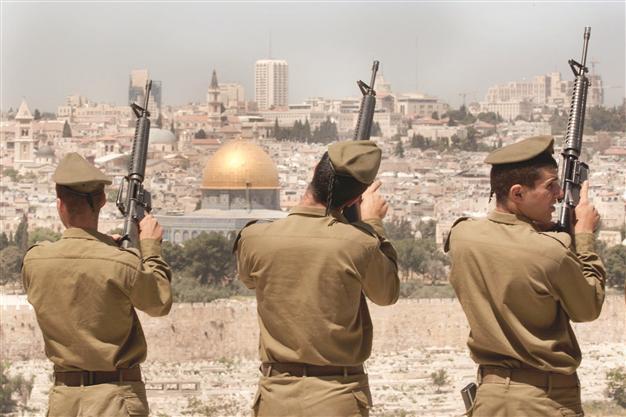US bids to revive Mideast talks
WASHINGTON

Israeli soldiers check their weapons following a Memorial Day ceremony on the Mount of Olives overlooking Jerusalem’s Old City. US Secretary of State Clinton met with lead Palestinian negotiator and Israeli deputy PM to get both sides back to peace talks. AP photo
The Obama administration is accelerating diplomatic efforts to get Israel and the Palestine back to peace talks, although there is little evidence the two sides are ready to resume direct negotiations.U.S. Secretary of State Hillary Clinton stepped up contacts with Israeli and Palestinian officials over the past week to persuade them to return to the table, beginning with a high-level meeting between Israeli Deputy Premier Shaul Mofaz and Palestinian President Mahmoud Abbas. Clinton met with chief Palestinian negotiator Saeb Erekat and Mofaz, a center-left politician who has said peace with the Palestinians should be an Israeli priority, on June 20. Last week, Clinton met Israel’s lead negotiator, Yitzhak Molcho, and spoke by phone with Israeli Prime Minister Benjamin Netanyahu and Abbas.
U.S. officials say the goal is to improve the atmosphere for direct talks which broke down three years ago and have yet to be resuscitated despite the administration’s multiple attempts. Recent developments, including announcements of new Israeli settlement construction and attacks from Gaza into Israel, have done nothing to improve the prospects for talks.
Mofaz dismisses preconditions
“We are working hard at keeping these parties working and talking, and trying to keep them committed to this process,” State Department spokeswoman Victoria Nuland said, according to the Associated Press. “The process is still very much alive. I don’t dispute the fact that we’ve had some bad incidents on the ground this week … but that is further to why these parties need to stay engaged.” Erekat, speaking to reporters after meeting with Clinton, said the Palestinians want to restart negotiations, but repeated the longstanding Palestinian demand that they can’t do so until and unless Israel stops settlement activity. “We want to resume negotiations,” he said. “We are not against negotiations.”
“The Israeli prime minister has a choice to make: settlements or peace,” Erekat said. “Because the question is: If you want two states, why are you raising settlements on the land that is supposed to be Palestine?” Palestinian leader Mahmoud Abbas last weekend blasted the peace process with Israel, labeling it as “clinically dead.” “The peace process is clinically dead and the Israeli side is definitely the one responsible,” Abbas said at a conference in Ramallah.
Mofaz said he believed Israeli-Palestinian peace talks would be renewed soon without preconditions. “I believe that there is an opportunity to restart negotiations. I have a firm basis for believing this will happen in the near future,” the Jerusalem Post quoted Mofaz as telling Israel Radio. In his interview, Mofaz said that the Palestinians preconditions have become an obstacle and that the upcoming negotiations must and will be restarted “without any preconditions.”
The Palestinians view settlement construction as a sign of bad faith and say there is no point in talking as long as Israel builds homes for its citizens on occupied lands that they claim for part of their eventual state. More than 500,000 Israelis now live in settlements in the West Bank and east Jerusalem.
Erekat said Abbas is studying a proposal to meet with Mofaz. Nuland would not comment on whether the administration was trying to broker such a meeting but said the United States is “looking for as much direct engagement between Israelis and Palestinians as we can have.”
















